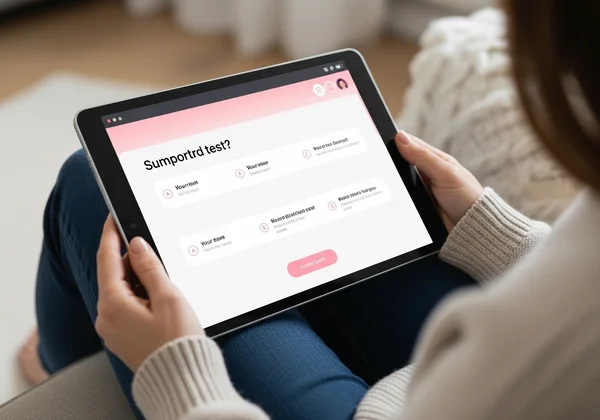Emotional vs. Platonic: A Guide for Women Exploring Their Sexuality
It's natural to feel overwhelmed when exploring deep connections with other women. Have you ever felt an incredibly intense bond and wondered: is this just a close friendship, or something more profound? Unpacking these powerful emotions can be daunting, but you’re not alone. With self-compassion and clarity, you can confidently embrace your authentic self.
This guide is here to help you unpack the complex world of emotional versus platonic attraction. For those seeking a personal tool on this path, a supportive lesbian test can be a great first step to explore your feelings.
Understanding Emotional vs. Platonic Attraction in Women
The line between a profound friendship and a budding romance can often feel blurry, especially for women, who are often socialized to form deep, emotionally intimate bonds with one another. Differentiating between these feelings is a key part of questioning your sexuality. It’s not about putting a label on every relationship, but about understanding the nature of your own attractions.

Defining Platonic Love: Deep Bonds Without Romantic Desire
Platonic love is a deep, affectionate attachment between individuals that is not romantic or sexual in nature. Think of your best friend—the person you share everything with, trust implicitly, and love dearly. These deep bonds are incredibly valuable and form the backbone of our support systems. You feel safe, understood, and cherished in their presence.
However, this connection doesn't typically involve romantic daydreams or a desire for physical intimacy beyond hugs or friendly gestures. It’s a love based on shared values, mutual respect, and companionship. Recognizing the beauty of platonic love is important, as it validates the powerful, non-romantic connections that enrich our lives.
What is Emotional Attraction? Beyond Mere Friendship
Emotional attraction is when you're drawn to someone's mind, personality, and spirit. It's the feeling of wanting to connect with someone on a deeply personal level, sharing your vulnerabilities, dreams, and fears. While it's a component of strong platonic friendships, in a romantic context, it takes on a different intensity. It becomes the foundation for a potential partnership.
This intimate connection makes you crave their presence in a way that feels different from a friend. You might find yourself thinking about them constantly, replaying conversations in your head, and feeling a unique sense of excitement or "spark" when they are near. This is often the first step in realizing you might see someone as more than just a friend. If you're looking to understand this feeling better, an "Am I a Lesbian?" test can offer prompts for reflection.
Key Differences: Friendship, Admiration, or Romantic Interest?
So, how do you tell the difference? It often comes down to the underlying desire and the nature of your thoughts. Admiration is respecting someone's qualities, like their intelligence or kindness. Friendship is enjoying their company and supporting them. Romantic interest includes all of that, plus a layer of longing and desire.
Consider these points for distinguishing feelings:
- Daydreams: Are your thoughts about them focused on hanging out and having fun (platonic), or do they veer into romantic scenarios, like holding hands, cuddling, or a future together?
- Jealousy: Do you feel a pang of jealousy when they talk about dating someone else? While mild possessiveness can exist in friendships, intense jealousy often points to romantic feelings.
- Physical Touch: Do you yearn for physical closeness that goes beyond a friendly hug? Do you think about what it would be like to kiss them? Untangling these threads can be complex, but being honest with yourself is the first step. An online lesbian quiz can provide a private space to sort these thoughts.
Recognizing Same-Sex Attraction: Is It More Than Just a Close Bond?
For many women, understanding same-sex attraction begins with a sense of confusion. Our society often presents a very narrow view of love and relationships, making it difficult to recognize or accept feelings that fall outside that norm. Learning to identify the signs in yourself is an act of self-discovery and empowerment.
Subtle Signs & Feelings: When Friendship Shifts
Often, attraction doesn't arrive with a thunderclap. It starts as subtle signs that a friendship is shifting into something more. You might find yourself prioritizing your time with her above everyone else. Her opinion of you suddenly matters immensely, and you might feel nervous or giddy around her in a way you don't with other friends.
These shifting dynamics can be unsettling if you don't have a framework for them. You might notice you're analyzing her texts for hidden meanings or feeling an unexplainable joy from a simple compliment she gives you. These are all valid indicators that your feelings may be romantic.
Physical vs. Emotional Cues: Decoding Your Internal Responses
Our bodies often know the truth before our minds do. Pay attention to your physical cues when you're around her. Does your heart beat a little faster? Do you get "butterflies" in your stomach? Do you find yourself blushing or feeling a magnetic pull to be physically closer to her?

These are different from the comfortable, safe feeling of being with a platonic friend. While emotional cues involve wanting to share your inner world, these internal responses are physical manifestations of attraction. Recognizing them can provide significant clarity on your journey of questioning your sexuality. If these cues feel familiar, you might want to start your self-discovery with a supportive tool.
The "Crush" Sensation: What Does It Feel Like for Women?
The crush sensation is universal, but it can feel uniquely confusing when it's for another woman for the first time. It's an exhilarating mix of admiration, obsession, and longing. You might find her occupying your thoughts, her laugh becoming your favorite sound, and her happiness becoming a priority for you.
This experience is completely normal and valid. Allowing yourself to feel it without judgment is crucial. It doesn't mean you have to act on it, but acknowledging these romantic feelings is a powerful step in understanding your orientation. Many women find that taking an "Am I a lesbian?" test helps them put a name to this wonderful, dizzying feeling.
Navigating Your Feelings: Common Queer Attraction Experiences
Realizing you might be attracted to women is a deeply personal journey, but you are not walking it alone. Many people share similar experiences when exploring queer attraction. Understanding these common psychological and social phenomena can make your own path feel less isolating and more manageable.
"Compulsory Heterosexuality" and Unpacking Societal Expectations
One of the biggest hurdles many women face is a concept called compulsory heterosexuality. This is the societal assumption that everyone is heterosexual and that it is the "default" or "normal" orientation. This pressure can cause women to explain away their feelings for other women, dismissing them as "just a girl crush" or an intense friendship.

Unpacking these societal norms is liberating. It allows you to see that your attractions aren't strange or wrong; they simply exist outside of the expectation that was placed upon you. Recognizing comp-het's influence can help you give your true feelings the consideration they deserve.
Trusting Your Gut: When Your Feelings Point to More
Ultimately, you are the foremost expert on your own life. After all the analysis and reflection, it often comes down to trusting your gut. If a deep, intuitive part of you feels that your connection with another woman is more than platonic, it deserves to be honored. Learning to listen to that inner voice is a skill that will serve you throughout your life.
Your personal truth is valid, regardless of what anyone else thinks or what societal expectations dictate. The journey of self-discovery is about aligning your life with that truth. For many, a simple tool can help build confidence in that gut feeling. If you're ready to listen to yours, take our lesbian test in a safe and private space.
Distinguishing between emotional and platonic attraction is a nuanced process filled with self-reflection. Remember that there are no right or wrong answers, only what feels true to you. Whether your connections are deep friendships or budding romances, they are all valuable parts of your life. The goal is not to force a label, but to understand yourself better so you can live more authentically.
If this guide has resonated with you, and you're seeking more clarity, we invite you to continue your exploration. Ready to take the next step in understanding yourself? Our confidential and supportive Lesbian Test is here to help make that exploration easier, leading to a richer, more authentic life.

Frequently Asked Questions About Understanding Your Attraction
Am I a lesbian or bisexual if I feel this way?
That's a great question, and one only you can answer. Sexuality is a spectrum. If you feel attracted to women, you might identify as lesbian, bisexual, pansexual, or another identity. The key is what feels right for you. A lesbian test quiz can be a helpful tool for reflection, but it doesn't define you—you do.
How do I know if I truly like girls, or if it's just a strong friendship?
This is the core of the emotional vs. platonic debate. Try to notice the nature of your thoughts. Do they involve romantic or physical longing? Do you feel a specific kind of jealousy? Exploring these questions honestly, perhaps with the help of our supportive quiz, can help you see the patterns in your feelings.
Is it normal to question your sexuality in your late teens or 20s?
Absolutely. It is completely normal to question your sexuality at any age, but it's especially common in your teens and twenties as you form your adult identity. It’s a sign of self-awareness and introspection. Many people explore their feelings during this time, and it's a healthy part of figuring out who you are.
What are the common signs of being attracted to another woman?
Common signs include thinking about her constantly, feeling nervous or excited around her, desiring physical closeness (like holding hands or kissing), feeling jealous of her other romantic interests, and daydreaming about a romantic future together. The signs are different for everyone, but these are often key indicators.